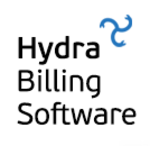Description

Hydra Billing

iCube
Comprehensive Overview: Hydra Billing vs iCube
Hydra Billing and iCube are software solutions designed primarily for managing billing and customer relationship functions across various industries. Here's an overview of these products, focusing on their primary functions, target markets, market presence, user base, and key differentiating factors.
a) Primary Functions and Target Markets
Hydra Billing:
-
Primary Functions: Hydra Billing is a robust billing and invoicing platform that focuses on providing comprehensive billing solutions. It offers functionalities such as usage-based billing, subscription management, invoicing, taxation compliance, payment processing, and financial reporting. It is designed to automate and streamline the entire billing process for businesses, reducing errors and enhancing efficiency.
-
Target Markets: Hydra Billing targets a wide range of industries, including telecommunications, utilities, and any subscription-based services. It is especially suitable for businesses with complex billing needs or those offering a variety of pricing models, such as tiered or usage-based plans.
iCube:
-
Primary Functions: iCube is centered around client relationship management and offers tools for billing but also extends to integrate with customer management solutions. It provides services like project management, time tracking, invoicing, client communication, and performance analytics. This makes it particularly useful for service-oriented businesses looking to enhance both billing and CRM capacities.
-
Target Markets: iCube primarily targets professional services firms such as consultancies, law firms, marketing agencies, and IT services that require a blend of billing precision and client relationship management.
b) Market Share and User Base
-
Market Share: Both Hydra Billing and iCube have carved out niches in their respective markets, but they differ significantly in scope and reach. Hydra Billing tends to have a larger share in industries that require sophisticated billing structures, such as telecommunications and utilities. Its modular and scalable architecture appeals to large enterprises with complex billing systems.
-
User Base: iCube, while smaller in terms of absolute market share compared to Hydra Billing, has a loyal user base among small to medium-sized professional services firms. Its strength lies in its user-friendly interface and integration capabilities with other CRM tools, making it attractive to businesses that highly prioritize client interaction alongside billing.
c) Key Differentiating Factors
-
Specialization: The most significant difference is their specialization. Hydra Billing is specialized in heavy-duty billing operations and excels in environments requiring advanced billing capabilities. It is thus chosen by businesses looking for thorough billing automation.
-
Integration and CRM: iCube’s integration with customer relationship management tools sets it apart. Businesses requiring a holistic solution for both client interaction and billing tend to prefer iCube. Its ability to seamlessly integrate project management and CRM makes it an attractive option for service-based firms.
-
Scalability and Modularity: Hydra Billing is known for its scalability and modular approach, which allows businesses to tailor the software to match specific billing needs and expand its capabilities as the business grows. This makes it more favorable for larger enterprises.
-
User Interface and Ease of Use: iCube offers an intuitive user interface aimed at users who may not have extensive technical expertise. It provides a smoother learning curve, enhancing user adoption in smaller businesses or teams without dedicated IT support.
In conclusion, both products serve distinct needs with some overlapping features. Their choice primarily depends on the business's focus area—complex billing operations versus comprehensive client management with simpler billing needs.
Contact Info

Year founded :
Not Available
Not Available
Not Available
Bulgaria
http://www.linkedin.com/company/hydra-billing-solutions

Year founded :
2014
Not Available
Not Available
Spain
Not Available
Feature Similarity Breakdown: Hydra Billing, iCube
To provide a feature similarity breakdown for Hydra Billing and iCube, let's examine the information provided by product documentation, user reviews, and other publicly available resources. Please note that the specifics might vary depending on the version or edition of the products. As of my last update, here is a general comparison:
a) Core Features in Common
-
Billing and Invoicing: Both platforms offer robust billing and invoicing capabilities, essential for managing customer payments and maintaining financial records.
-
Subscription Management: They support managing recurring subscriptions, allowing businesses to automate billing cycles and track subscription statuses.
-
Payment Gateway Integrations: Hydra Billing and iCube can integrate with multiple payment gateways, ensuring flexible payment processing options for clients.
-
Reporting and Analytics: Each provides reporting tools to track key metrics and financial performance, aiding businesses in making data-driven decisions.
-
Customer Management: Both have features for managing customer details and histories, which is critical for maintaining service quality and personalization.
b) Comparison of User Interfaces
-
Hydra Billing: Typically known for its straightforward and user-friendly interface, Hydra Billing is designed to be intuitive, helping users navigate its features with ease. The dashboard often provides clear visibility into financial metrics and system alerts.
-
iCube: The user interface of iCube is similarly user-centric but might offer a richer set of customization options. It aims to balance aesthetic appeal with functional clarity, potentially offering more visual dashboards and customizable data reports.
The overall comparison in user interfaces often comes down to a user's preference for simplicity versus customization and visual interaction.
c) Unique Features
Hydra Billing:
- Usage-Based Billing: Hydra Billing might offer specific tools for more complex billing scenarios, such as usage-based billing, which is particularly useful for telecom or utility companies.
- API Access: There might be robust API access, allowing developers to integrate with third-party applications and create customized workflows.
iCube:
- Advanced Customization: iCube may provide more advanced customization features, allowing users to tailor interfaces and reports according to their specific needs.
- Modular Architecture: iCube might offer a modular architecture, enabling users to pick and choose functionalities based on business requirements without bloating the platform with unnecessary features.
These unique features could steer a company towards one solution over another based on their specific billing needs and existing infrastructure. However, the choice between the two can often be more strategic, considering factors like integration with existing systems, scalability needs, and budget constraints. Always recommended to engage in a trial period or request a demo to see firsthand how each platform operates in a real-world scenario.
Features

User-Friendly Dashboard
Flexible Payment Options
Customer Management
Automated Billing Cycles
Comprehensive Reporting

Integration
User Management
Data Analysis
Customer Support
Best Fit Use Cases: Hydra Billing, iCube
Hydra Billing and iCube are solutions that cater to specific billing and customer management needs. Here's a breakdown of their best fit use cases:
a) Hydra Billing:
-
Telecommunications and Utilities:
- Hydra Billing is an excellent choice for telecom companies and utility providers due to its ability to handle complex billing scenarios, including prepaid and postpaid plans.
- Its scalability allows it to manage millions of transactions, making it ideal for large service providers.
-
Subscription-Based Services:
- Companies offering subscription services like SaaS can benefit from Hydra Billing's robust recurring billing functionalities.
- Its features support diverse subscription models, including tiered and usage-based pricing.
-
Financial Services:
- Hydra Billing supports financial institutions requiring detailed transaction management and reporting.
- The flexibility to integrate with existing financial systems is crucial for these organizations.
b) iCube:
-
Small to Medium Enterprises (SMEs):
- iCube is often preferred by SMEs due to its cost-effectiveness and user-friendly interface.
- It offers sufficient billing automation without the complexity that might be overwhelming for smaller teams.
-
Retail and E-commerce:
- Retail businesses that require straightforward billing solutions benefit from iCube's adaptive features focused on sales and inventory management.
- Its capacity to integrate with e-commerce platforms is a significant advantage for online retailers.
-
Startups:
- Startups, particularly in their growth phase, can leverage iCube's scalable solutions that expand with business needs.
- It provides essential tools for customer relationship management and reporting without hefty initial investments.
d) Industry Verticals and Company Sizes:
-
Hydra Billing's Versatility:
- Hydra Billing caters to large-scale businesses across telecommunications, utilities, and finance where transaction volume and complexity are significant.
- It is well-suited for industries that require in-depth customization and integration capabilities with existing systems.
-
iCube's Focused Approach:
- iCube is tailored more towards SMEs and startups needing efficient, practical systems without elaborate setups.
- Its industry reach extends to retail, e-commerce, and other sectors needing basic billing and CRM functionality without overwhelming customization.
Both products serve distinct niches within the market, with Hydra Billing focusing on high-volume, complex billing environments, and iCube providing a streamlined, budget-friendly solution for smaller or less complex billing needs.
Pricing

Pricing Not Available

Pricing Not Available
Metrics History
Metrics History
Comparing teamSize across companies
Conclusion & Final Verdict: Hydra Billing vs iCube
Conclusion and Final Verdict for Hydra Billing vs. iCube
Best Overall Value
Considering all factors such as pricing, features, scalability, user-friendliness, and customer support, it is essential to determine which product offers the best overall value based on specific user needs. If you are looking for a more comprehensive, flexible solution with robust customization options for complex billing scenarios, Hydra Billing may offer better value. However, if ease of use, implementation speed, and support are your priorities, iCube might be the more suitable option.
Pros and Cons
Hydra Billing:
Pros:
- Comprehensive Features: Offers extensive features that cater to various industries, making it suitable for complex billing operations.
- Customization: Highly customizable to meet specific business needs.
- Scalability: Designed to handle large volumes of transactions and can grow with your business.
Cons:
- Complexity: The extensive features and customization options can lead to a steep learning curve.
- Cost: Potentially higher cost, especially for small to medium-sized businesses due to its extensive feature set.
- Implementation Time: May require longer implementation and integration time due to its complexity.
iCube:
Pros:
- User-Friendly: Designed with a focus on ease of use, making it accessible for businesses with less technical expertise.
- Quick Implementation: Faster to implement due to its simpler, more streamlined feature set.
- Cost-Effective: More affordable option for small to medium-sized businesses looking for efficient, basic billing solutions.
Cons:
- Feature Limitations: May lack some advanced features and customization options that larger or more complex businesses require.
- Scalability Concerns: May not be as scalable or flexible for businesses experiencing rapid growth or those with unique billing needs.
Recommendations
When deciding between Hydra Billing and iCube, consider the following recommendations based on your specific business requirements:
-
Assess Business Size and Needs: If your business is large and requires a highly customizable billing solution with complex features, Hydra Billing might be the better option. For smaller businesses focused on simplicity and cost-efficiency, iCube could be more suitable.
-
Consider Long-Term Growth: Evaluate whether your business will need to scale rapidly in the future and choose the solution that can best accommodate growth.
-
Weigh Implementation and Support: If quick implementation and ongoing support are priorities, evaluate which provider offers better training and customer support services.
-
Budget Constraints: Consider your budget for initial implementation and ongoing expenses to ensure the chosen solution remains sustainable.
Ultimately, the decision should be based on matching the solution’s capabilities with your business’s billing requirements, technical expertise, and growth trajectory.
Add to compare
Add similar companies




